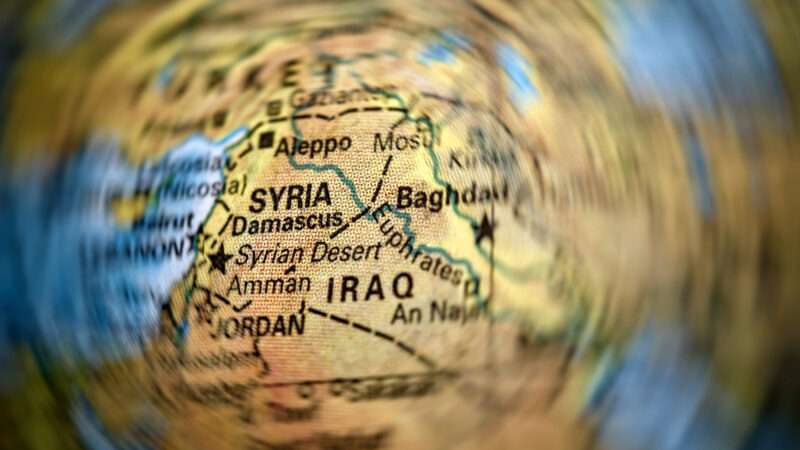
U.S. officials ritualistically tout their respect for Iraq's sovereignty and territorial integrity, but the fact is that every U.S. president over the last 33 years has bombed Iraq in one way or another. The 1991 Gulf War occurred during George H.W. Bush's administration. Bill Clinton authorized several rounds of airstrikes against Iraqi military facilities, including a four-day bombing campaign in December 1998. George W. Bush's decision to invade and occupy Iraq in 2003 sucked hundreds of thousands of U.S. troops into a nearly decade-long morass. Barack Obama brought U.S. troops back to Iraq in 2014 after the Islamic State arrived at the gates of Baghdad, while Donald Trump continued the military campaign throughout his term.
President Joe Biden, too, has taken military action in Iraq during his first three years as president. Approximately 2,500 U.S. troops are stationed in several large bases across the country, ostensibly tasked with the "enduring defeat" of ISIS. U.S. special operators partner with their Iraqi colleagues to capture and kill ISIS leaders, planners, and facilitators. The U.S. military has also taken unilateral action against Shia militias that have lobbed attack drones and rockets toward U.S. bases on a regular basis since mid-October. On January 4, the U.S. killed Abu Taqwa, a senior commander of the Harakat Al Nujaba militia, in the heart of Baghdad.
The Iraqi government responded with fury to that airstrike in particular, blasting the U.S.-led coalition for violating the agreement governing the U.S. military's operations on Iraqi soil. Days later, Iraqi Prime Minister Mohammed Shia Al Sudani, who a year ago insisted Baghdad still needed a U.S. military presence, pledged to form a committee to boot U.S. forces out.
The conventional wisdom in Washington, D.C. is to shudder with fright at the news. But for those who have long believed the U.S. military presence in Iraq had lost its utility, two words sum up the development: good riddance.
First, we should be clear about one thing: while ISIS is still around, its capacity to plan and execute large-scale terrorist attacks is severely degraded. ISIS no longer controls any territory in Iraq (or Syria, for that matter), which means the group has lost its ability to tax people living under its thumb. The decline in financial resources, combined with the constant targeting of ISIS commanders and the Iraqi army's growing capabilities, translates into a low pace of attacks from the group (less than 20 per month, according to the Pentagon's inspector general for the counter-ISIS mission in Iraq and Syria). Attacks that do happen are unsophisticated, against targets of opportunity, and typically take place in remote areas where the Iraqi state has long had trouble extending its writ. Whatever support base ISIS once possessed is gone, replaced instead with millions of angry Iraqis who have first-hand experience with ISIS's brutal rule and no intention of letting the organization reemerge as a viable pseudo-state actor.
Despite all this, successive U.S. administrations continue to argue that Washington's job isn't done. Before he retired as the top U.S. commander in the Middle East, Gen. Frank McKenzie predicted that U.S. forces would be in Iraq for years. The Biden administration apparently agrees with this assessment. During a bilateral security committee meeting with Iraqi defense officials last summer, the Defense Department said in a joint statement that both delegations "reaffirmed their commitment to developing Iraq's security and defense capabilities and determination to deepen security cooperation across a full range of issues to advance our countries' shared interest in Iraq's security and sovereignty, and in the stability of the region."
Parse the cookie-cutter language, however, and one can see just how maximalist all of these objectives really are. If the U.S. is prefacing a withdrawal from Iraq on the stability of the region, then it either doesn't really want to leave Iraq in the first place or does, but only in the most ideal of circumstances. Either way, the result is the same: a perpetual U.S. military mission with little return on investment.
If U.S. troops weren't dealing with so much risk in the meantime, perhaps advocates of a long-term U.S. military deployment in Iraq would have a halfway decent case to make. But this isn't the reality our troops are dealing with. Iranian-backed militias have attacked U.S. forces more than 115 times since October 17. Some of the militias launching these attacks are technically a part of the Iraqi state. Fortunately, fatalities have been avoided thus far. Even so, the danger is of such sufficient gravity that President Biden authorized a few rounds of precision airstrikes in retaliation. Defense Department assertions that these strikes are having a deterrent effect on these militias don't pass the laugh test for the simple reason that the drone and missile attacks keep coming. U.S. pressure on the Iraqi government to get the militias under control (CIA Director William Burns reportedly warned the Iraqi prime minister of "harsh consequences" if the militias couldn't be reeled in) isn't working either. That shouldn't be a surprise; the only reason Al Sudani is in the prime minister's office is because the Coordination Framework, which represents the militias' interests in the Iraqi government, supported him.
U.S. policymakers, therefore, have a choice to make. They can continue the status-quo policy, which amounts to being a willing hostage to an indefinite mission and carrying on with the delusion that any Iraqi prime minister has the power to do much of anything about the militias. Or they can finally admit that the U.S. has succeeded in doing what it set out to do—eliminating ISIS's proton-state—and extricate the U.S. military from a mess only the Iraqis have the ability to clean up.
The post The U.S. Is Done In Iraq appeared first on Reason.com.







